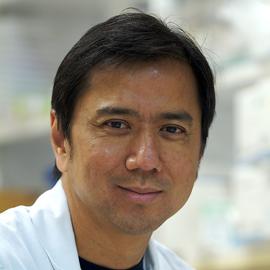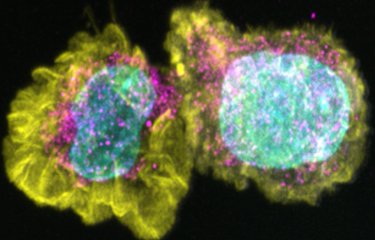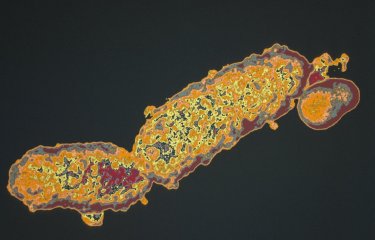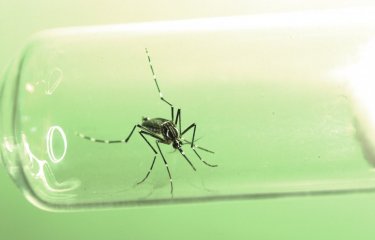In-Cell-Art (ICA), a biotechnology company specialized in nanocarrier technologies, BioNet-Asia (BNA), an innovative vaccine developer, and the research team led by Dr. Anavaj Sakuntabhai at the Functional Genetics of Infectious Diseases Unit, Institut Pasteur Paris France, (GFMI-IP), announce today the development of Nanotaxi® formulated DNA vaccine to induce strong immune response against dengue virus.
Under this collaboration, ICA, thanks to Nanotaxi® designed to unlock the promise of nucleic acids to treat diseases, and Dr. Sakuntabhai, with his expertise on genetic susceptibility to mosquito-borne infection, created a single component pentavalent dengue-Zika vaccine preventing antibody-dependent enhancement phenomenon. This project has been selected to be funded by the Scientific Council of the Southeast Asia-Europe Joint Funding Scheme and was praised for its vision and expert team.
A monovalent DNA/Nanotaxi® vaccine was tested in the first instance for the evaluation of immune response against various epitopes of dengue virus.
For low-dose and mono- or multivalent vaccine design, the delivery method uses Nanotaxi®, which can deliver genetic material directly into the cytosol to increase dramatically gene expression and elicit very strong innate immune responses.
Under this collaborative effort, and with the financial supports from Agence Nationale de la Recherche - France (ANR), Thailand Center of Excellence for Life Sciences (TCELS), ICA, BNA, Institut Pasteur Cambodia, and Chulalongkorn university (Thailand), will continue the candidate development to optimize antigen compositions to induce broadly cross-reactive immune responses for Zika and dengue viruses while preventing antibody-dependent enhancement phenomenon by a patented approach.
Bruno Pitard, a founder of In-Cell-Art, says “This is an important first milestone to realize a highly polyvalent vaccination strategy which can overcome the issues of genetic variation and antigenic diversity in dengue and Zika viruses. Our Nanotaxi® technology can deliver many DNA variants at once. This allows us to develop a single injection, which contains a set of diverse antigens that vary in key positions to induce immune responses with unprecedented breadth and potency.”

Dr. Anavaj Sakuntabhai, head of the Functional Genetics of Infectious Diseases Unit at the Institut Pasteur, principal investigator of the project
With the challenge of protecting people against dengue virus, we certainly need a next generation dengue vaccine, which could protect people from the antibody-dependent enhancement phenomenon. We use a combination of highly innovative approaches, which are based on conserved regions of T cell epitopes among the 4 serotypes of dengue virus, and Zika virus.
Professor Dr. Suchinda Malaivijitnond, Director of the National Primate Research Center of Thailand-Chulalongkorn University, said “We are very grateful to be in the supporting part of this exciting, state of the art project which brings together scientists and researchers from across continents and among academic and private sectors. As we look forward to the challenges of vaccine development, we can be assured that together we can play a part in driving both academic and economic advancement for these vaccines development, not only for Thailand but for the world. With these special collaborations, I believe that we are steping closer to improve the health and quality of life for all”.
Dr. Pham Hong Thai, Chief Executive Officer of BioNet-Asia, said: “We are delighted to collaborate with the Pasteur Institute, In-Cell-Art and the other members of this exciting project. Given BioNet’s previous experience on dengue vaccine development, we are confident that this vaccine candidate has the potential to circumvent the limitations of current dengue vaccine development approaches, and this unique collaboration is a step closer to bring an effective vaccine for those in need”.
Dr. Nares Damrongchai, Chief Executive Officer of TCELS, said: “This is one of the first projects selected for funding by Southeast Asia-Europe Joint Funding Scheme. We are confident in the competency of these finest Thai-French partners, and we are committed to support them in finding a new way to control dengue transmission and contribute to global health“.
About the Functional Genetics of Infectious Diseases Unit, Institut Pasteur, (GFMI)
The GFMI unit is an internationally recognized research laboratory at the Institut Pasteur, headed by Dr Anavaj Sakuntabhai. They have significant experience as coordinators of international projects such as the European FP7 project on Dengue Framework for Resisting Epidemics in Europe (DENFREE). They combine epidemiology, immunology and human genetics in order to identify key factors determining dengue transmission and dengue epidemics and develop new tools and strategies for controlling dengue transmission.
About the Institut Pasteur and the Institut Pasteur International Network
The Institut Pasteur, a private foundation with officially recognized charitable status set up by Louis Pasteur in 1887 and inaugurated on November 14th, 1888, has been, for the past 130 years, an internationally renowned center for biomedical research with a network of 33 institutes worldwide. In the pursuit of its mission to prevent and fight against diseases in France and throughout the world, the Institut Pasteur operates in four main areas: scientific and medical research, public health and health monitoring, teaching, and business development and technology transfer.
More than 2,500 people work on its Paris campus. The Institut Pasteur is a globally recognized leader in infectious diseases, microbiology, and immunology. Its 130 units also focus their research on certain cancers, genetic and neurodegenerative diseases, genomics and developmental biology. This research aims to expand our knowledge of living organisms in a bid to lay the foundation for new prevention strategies and novel therapeutics. Since its inception, 10 Institut Pasteur scientists have been awarded the Nobel Prize for Medicine, including two in 2008 for the 1983 discovery of the human immunodeficiency virus (HIV) that causes AIDS. www.pasteur.fr/en
About In-Cell-Art
In-Cell-Art (ICA), which is headquartered in Nantes (France) is a biopharmaceutical company specializing in the preclinical and pharmaceutical development of nanocarriers named Nanotaxi ® for macromolecular drugs. Its founder and research team, which includes a Nobel Laureate, have designed new classes of vectors that are organized on a nanometric scale, which enables them to cross the cell barrier efficiently and safely. ICA Nanotaxi® technology displays unique properties for development of:
・DNA Vaccines
ICA614 Nanotaxi®, an innovative DNA synthetic formulation, offers unique efficient and industrial features such as the dramatic enhancement of the immunogenicity of plasmid DNA-encoding tumors or pathogen-derived antigens, a reduction in the dose of plasmid DNA, as well as an excellent safety profile. ICA614 Nanotaxi® represents a crucial step in DNA vaccine development, and GMP fill/finish of ICA614 Nanotaxi®, as well as regulatory-enabling GLP safety evaluation of ICA614 Nanotaxi® alone HEPAVAC (Hepatocellular vaccine candidate) have been achieved successfully.
・mRNA Vaccines
Some other ICA Nanotaxi® are also being assessed in $33.1 million RN-ARMORVAX consortium, co-funded by US Defense Advanced Research Projects Agency (DARPA). The consortium would validate the new application of ICA Nanotaxi® for mRNA-based vaccines for infectious diseases in collaboration with CureVac and Sanofi-Pasteur.
・mRNA Replacement Therapies
Some other ICA Nanotaxi® are also developed to improve the limited efficacy and stability of mRNA therapeutics, leading to the dramatic increase in therapeutic protein expression without DNA-encoded gene.
In-Cell-Art is a privately held company, which was founded in 2005, laureate in 2012 and 2013 of the Fast 50 Deloitte award. It is a member of the Atlanpole Biotherapies high-tech cluster of biotechnology companies in western France.
About BioNet-Asia
BioNet-Asia Co., Ltd is a vaccine company with fully integrated operations from research to manufacturing and distribution. For the last 15 years, the company has been focusing on biotech innovation and global market access. BioNet has successfully built many partnerships leading to the supply of hundred millions of doses of vaccines every year worldwide, and it has been granted approval in Thailand for the first recombinant acellular pertussis vaccines presented as a monovalent aP and as a combined TdaP vaccine for booster indication in adolescents and adults.





